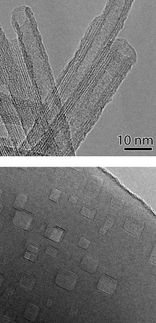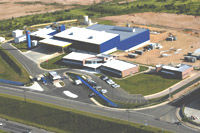New material absorbs, conserves oil
Case Western Reserve University engineers target industry to oceans
Advertisement
An ultra-lightweight sponge made of clay and a bit of high-grade plastic draws oil out of contaminated water but leaves the water behind.
And, lab tests show that oil absorbed can be squeezed back out for use.
Case Western Reserve University researchers who made the material, called an aerogel, believe it will effectively clean up spills of all kinds of oils and solvents on factory floors and roadways, rivers and oceans.
The EPA estimates that 10 to 25 million gallons of oil are spilled annually in this country alone. Spilled oil ruins drinking water, is a fire and explosion hazard, damages farmland and beaches and destroys wildlife and habitats. The harm can last decades.
The aerogel is made by mixing clay with a polymer and water in a blender, said David Schiraldi, chairman of the Macromolecular Science and Engineering department at the Case School of Engineering.
The mixture is then freeze-dried; air fills the gaps left by the loss of water. The resulting material is super light, comprised of about 96 percent air, 2 percent polymer and 2 percent clay.
The oil-absorbing form is just one of a growing list of clay-based aerogels being made in Schiraldi's lab. By adding different polymers, they produce materials with different properties.
"This particular one is oleophilic or oil-loving," Schiraldi said. "Chemically, it hates water, loves oil: the perfect combination."
The aeorgel can be made in granular form, in sheets or in blocks of almost any shape and is effective in fresh and saltwater or on a surface. Because absorption is a physical phenomenon, there is no chemical reaction between the material and oil. If the oil is otherwise not contaminated, it can be used.
Oil spill experts on both coasts say that the ability to squeeze out and conserve the oil is an advantage over other products currently available.
The material was first made when Schiraldi challenged his then-PhD student Matt Gawryla with idea of making kitty litter. Gawryla added the oil cleanup concept to the program.
Case Western Reserve has granted a 9-month exclusive license for this and other clay-based aerogel technologies to AeroClay, Inc. a startup company. Schiraldi will be chief scientific officer of the new company.




























































